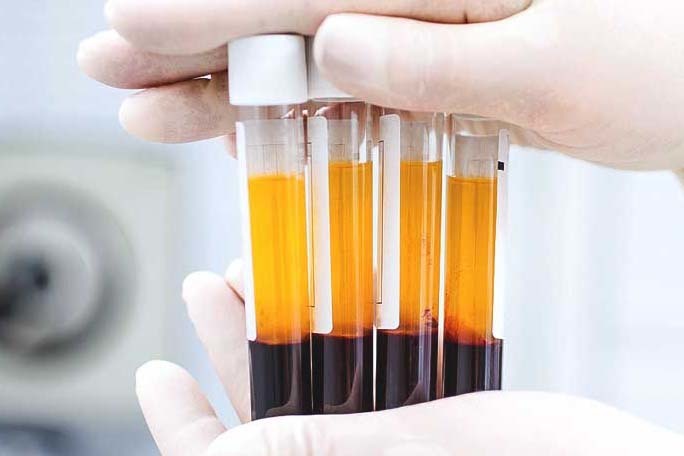
Prospective Evaluation of Platelet-Rich Plasma and Bone Marrow Concentrate Treatment to Accelerate Healing After Anterior Cruciate Ligament Reconstruction
ENROLLMENT COMPLETE
Principal Investigator: Peter Millett, MD, MSc
This is a prospective, randomized, placebo-controlled trial to evaluate potential beneficial effects of leukocyte-poor platelet-rich plasma (LP-PRP) and bone marrow concentrate (BMC) on the healing and health of critical joint tissues (grafts/ligaments, meniscus and cartilage) in the knee following anterior cruciate ligament (ACL) reconstruction surgery. This trial will compare the two injection procedures against a control group (no injection). BMC subjects will have bone marrow aspirated from the subject’s iliac crests and the cellular rich portion will be concentrated and subsequently injected into the subjects' symptomatic knee. PRP subjects will have a venous blood draw with subsequent platelet concentration. The resulting PRP will be injected into the symptomatic knee. Follow-up visits involving imaging and biomotion testing will take place at 2 weeks, 6 months and 12 months after the ACL reconstruction surgery.
The study will be conducted at The Steadman Clinic, Steadman Philippon Research Institute, and Vail Valley Surgery Center. This study is supported by The United States Department of Defense: Office of Naval Research.
For additional information, please visit www.clinicaltrials.gov and search for: NCT04205656.
Objectives:
Eligibility Criteria:
Inclusion Criteria:
Subjects will be included if all the following criteria are met:
Exclusion Criteria:
Subjects will be excluded if any of the following criteria are met:
Principal Investigator: Peter Millett, MD, MSc
This is a prospective, randomized, placebo-controlled trial to evaluate potential beneficial effects of leukocyte-poor platelet-rich plasma (LP-PRP) and bone marrow concentrate (BMC) on the healing and health of critical joint tissues (grafts/ligaments, meniscus and cartilage) in the knee following anterior cruciate ligament (ACL) reconstruction surgery. This trial will compare the two injection procedures against a control group (no injection). BMC subjects will have bone marrow aspirated from the subject’s iliac crests and the cellular rich portion will be concentrated and subsequently injected into the subjects' symptomatic knee. PRP subjects will have a venous blood draw with subsequent platelet concentration. The resulting PRP will be injected into the symptomatic knee. Follow-up visits involving imaging and biomotion testing will take place at 2 weeks, 6 months and 12 months after the ACL reconstruction surgery.
The study will be conducted at The Steadman Clinic, Steadman Philippon Research Institute, and Vail Valley Surgery Center. This study is supported by The United States Department of Defense: Office of Naval Research.
For additional information, please visit www.clinicaltrials.gov and search for: NCT04205656.
Objectives:
- Collect clinical outcomes data, imaging data, strength and physical function data and patient-reported outcomes to compare amongst investigational and control groups.
- Determine the signature protein and cellular profiles of PRP and BMC to compare to optimal clinical, biomechanical and MRI results after ACL reconstruction surgery.
Eligibility Criteria:
Inclusion Criteria:
Subjects will be included if all the following criteria are met:
- Age 16-50 years at the time of ACLR surgery;
- Acute ACL injury within 6 months of scheduled ACLR surgery;
- Scheduled for unilateral, primary ACLR with a BTB (bone-patellar tendon-bone) autograft;
- The following concomitant injuries are allowed:
- Meniscal injuries of all types, grades and regardless of surgical treatment;
- Articular chondral injury that can be addressed with debridement or chondroplasty;
- Tibial impaction fractures;
- Non-operative sprains/injuries of MCL or LCL;
- Willing and able to comply with all required post-operative visits, biomotion and imaging tests, the self-completion of questionnaires and other trial procedures.
Exclusion Criteria:
Subjects will be excluded if any of the following criteria are met:
- Inability to provide informed consent;
- Women who are pregnant;
- Previous surgery for either knee except in cases of prior diagnostic arthroscopy and/or minimal debridement;
- Significant osteoarthritis (OA) of the knee (e.g. grade 4 with cystic changes and/or significant osteophytes);
- Concomitant cartilage restoration procedure in the operative knee;
- Biologic treatment (e.g. PRP, BMC, prolotherapy, etc.) in the operative knee within 6 months of ACLR surgery;
- Steroid injections in the operative knee within 3 months of ACLR surgery;
- Open growth plates (determined by the treating physician based on standard-of-care preoperative knee radiographs);
- History of deep vein thrombosis (DVT) or pulmonary embolism (PE) that requires additional anticoagulation beyond usual post-operative standard of care;
- Current or known history of significant active autoimmune disease (i.e. rheumatoid arthritis and SLE);
- Incompatible MRI hardware/devices and/or inability to safely undergo MRI per the MRI safety screening questionnaire;
- Known balance or vestibular disorders, if in the opinion of the Principal Investigator or delegated clinician may affect ability to safely comply with study procedures;
- History of significant radiation exposure, e.g. due to radiation therapy or occupational exposure;
- Active malignancy of any type or history of a malignancy within 2 years of informed consent (with the exception of subjects with a history of treated basal or squamous cell carcinoma);
- Concurrent or previous participation in another clinical trial within 30 days prior to informed consent;
- Concurrent enrollment in DOD project 4, Vail Health Hospital IRB # 2018-20, is allowed while subjects on this study are in the 18-month follow-up period;
- Concurrent enrollment in non-interventional registry studies or blood-banking/biomarker studies is allowed;
- History of substance abuse (drug or alcohol) that may interfere with the subject’s ability to cooperate and comply with the trial procedures;
- Severe acute or chronic medical or psychiatric condition or laboratory abnormality that may increase the risk associated with trial participation or investigational product administration or may interfere with the interpretation of trial results and, in the judgment of the Principal Investigator or delegated clinician, would make the subject inappropriate for entry into this trial.
Subjects will be withdrawn from the study (Screen Failures) after providing informed consent and/or at the time of ACLR surgery if they meet any of the following criteria: - Concurrent reconstruction of any knee ligaments other than the ACL;
- ACLR which requires the following concomitant treatments: bone plating, metal implants (with the exception of titanium interference screws) or microfracture;
- Inability to collect sufficient research samples (e.g. less than the minimum required amount of BMA is harvested, or clotting occurs).

